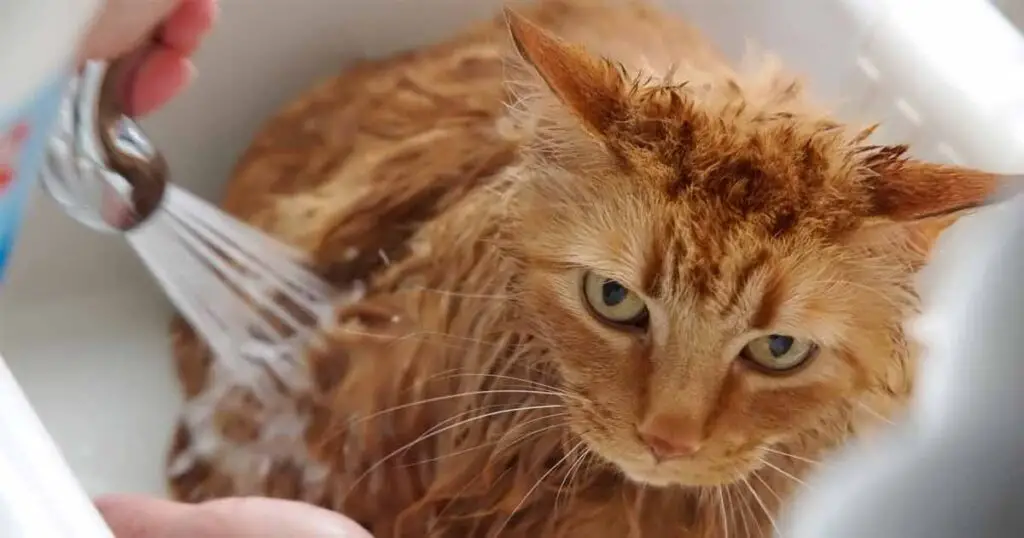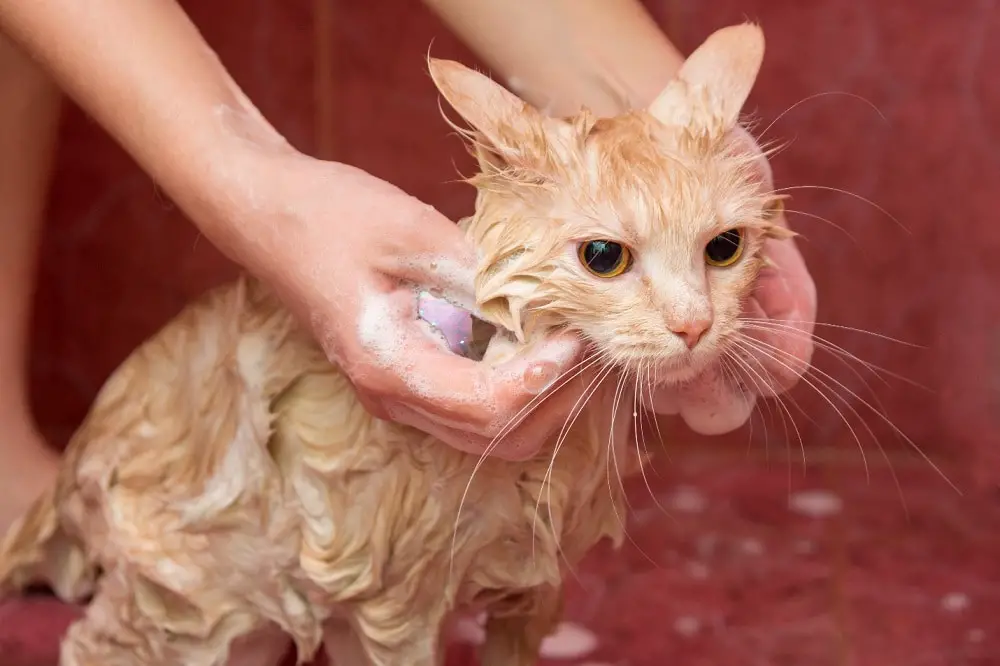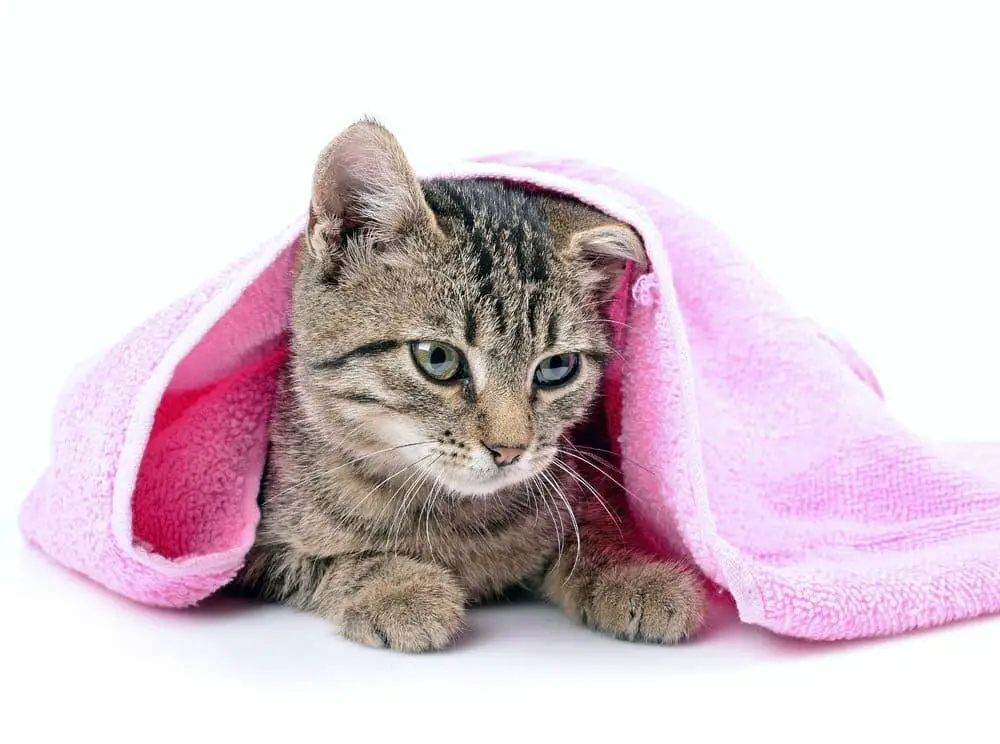Introduction
How Often Should You Bathe Your Cat: As a cat owner, you may have wondered how often you should bathe your furry friend. Cats are known for their cleanliness and spend a significant amount of time grooming themselves. However, there are certain circumstances where giving your cat a bath is necessary. Understanding the appropriate frequency for bathing your cat can help maintain their health and well-being.
Cats are equipped with a natural grooming mechanism that involves licking their fur to keep it clean and free from dirt and debris. Their tongues have tiny barbs that act as a comb, removing loose hair and stimulating the production of natural oils that keep their coat shiny and healthy.
There are situations where bathing your cat becomes necessary. For example, if your cat has a skin condition or is infested with fleas, a bath with a specially cat nails formulated cat shampoo may be required. Additionally, if your cat has gotten into something sticky or dirty, a bath can help remove the substance from their fur.
When it comes to determining the frequency of baths for your cat, it largely depends on their individual needs and circumstances. Some cats may require more frequent baths due to medical conditions or allergies, while others may only need a bath once or twice a year. It’s important to consult with your veterinarian to determine the appropriate bathing schedule for your cat.

Do indoor cats need baths?
Generally, cats do not need baths. After all, grooming themselves is something cats do often and well.
Indoor cats are known for their cleanliness and self-grooming habits. They spend a significant amount of time licking themselves to keep their fur clean and free from dirt and debris. As a result, many cat owners wonder if it is necessary to give their indoor cats baths.
While indoor cats generally do not require regular baths like dogs do, there are certain situations where a bath may be necessary. For example, if your cat gets into something sticky or dirty, such as paint or oil, a bath may be needed to remove the substance from their fur. Your cat has a skin condition or is prone to allergies, a bath with a specialized shampoo recommended by your veterinarian may be beneficial.
Cats have a natural oil on their skin and fur that helps to keep them moisturized and protected. Over-bathing can strip away these oils and lead to dry skin and other skin problems. Therefore, it is generally recommended to only bathe your indoor cat when necessary and to use a gentle, cat-specific shampoo.
When bathing your indoor cat, it is important to create a calm and comfortable environment. Fill a sink or bathtub with warm water, making sure it is not too hot or too cold. Gently place your cat in the water and use a cup or spray nozzle to wet their fur. Apply a small amount of shampoo and lather it into their fur, being careful to avoid their eyes and ears. Rinse thoroughly and towel dry your cat, or allow them to air dry in a warm room.
Cats do not typically need regular baths, there are certain situations where a bath may be necessary for their health and hygiene. It is important to use a gentle shampoo and to only bathe your cat when necessary to avoid stripping away their natural oils and causing skin problems.
Can you bathe a cat once a week?
In general, cats should be given a bath once every 4-6 weeks, depending on how often they groom themselves, and the environment they’re usually in. If your cat is more outdoorsy and soils itself while playing, it’s a good idea to help with the grooming process as they alone won’t be able to properly get cleaned.
Yes, you can bathe a cat once a week. Cats enjoy being bathed and some may become stressed or anxious during the process. It is always best to consult with your veterinarian before establishing a bathing routine for your cat.
Bathing a cat once a week can help to keep their coat clean and free of dirt, debris, and allergens. It can also help to reduce shedding and minimize the occurrence of hairballs. Regular bathing can also be beneficial for cats with certain skin conditions or allergies.
When bathing a cat, it is important to use a cat-specific shampoo that is gentle and formulated for their sensitive skin. Human shampoos can be too harsh and may cause skin irritation or dryness. It is also important to use lukewarm water and to avoid getting water in their ears or eyes.
Before bathing your cat, it is a good idea to brush their coat to remove any tangles or mats. This will make the bathing process easier and more comfortable for your cat. It is also important to have all of your supplies ready and within reach, including towels, a non-slip mat for the bathtub or sink, and a gentle brush or comb.
During the bath, it is important to be gentle and calm. Speak softly to your cat and reassure them throughout the process. Start by wetting their coat with lukewarm water, being careful to avoid their face. Apply a small amount of shampoo and gently massage it into their fur, being careful not to pull or tug on their hair. Rinse thoroughly and then gently towel dry your cat, being careful not to rub too vigorously.
Is it necessary to bathe a cat?
“Domestic felines do not need to be bathed,” says Spano. “Cats, unlike dogs, groom themselves daily—this is a normal species behavior. The majority of cats also may not like being exposed to water, and an unnecessary bath can be very stressful and uncomfortable for those felines unaccustomed to water.”
Many people wonder whether it is necessary to bathe a cat. Cats are known for their cleanliness and grooming habits, so it may seem unnecessary to bathe them. However, there are certain situations where bathing a cat can be beneficial for their health and well-being.
Firstly, some cats may have medical conditions that require regular bathing. For example, cats with skin allergies or dermatitis may need to be bathed with special medicated shampoos to alleviate their symptoms. Additionally, cats with certain parasites, such as fleas or mites, may need to be bathed to remove these pests from their fur.
Secondly, bathing can help to reduce shedding in cats. Cats naturally shed their fur, and regular brushing can help to remove loose hair. However, some cats may have excessive shedding or may develop mats in their fur, which can be difficult to remove with brushing alone. In these cases, bathing can help to remove the excess hair and prevent matting.
Thirdly, bathing can be beneficial for cats that have gotten into something dirty or sticky. Cats are curious animals and may sometimes get into substances that can be harmful if ingested or left on their fur. In these situations, bathing can help to remove the substance and prevent any potential health issues.
Lastly, bathing can also be a bonding experience between a cat and its owner. While not all cats enjoy being bathed, some may tolerate or even enjoy the experience if it is done gently and with positive reinforcement. This can help to strengthen the bond between the cat and its owner.
Can I bathe my cat too often?
The frequency of bathing a cat depends on their age, comfort levels and their needs. Little kittens are ought to be bathed regularly every three days, because of their dirt. When they are 12 months old and older, you can bathe them every month and not longer than every three to four months.
Many cat owners wonder how often they should bathe their feline companions. While cats are known for their grooming habits and ability to keep themselves clean, there may be instances where a bath is necessary. However, it is important to understand that cats are not like dogs and do not require frequent bathing. In fact, bathing a cat too often can have negative effects on their skin and coat.
Cats are naturally clean animals and spend a significant amount of time grooming themselves. Their tongues have tiny barbs that act as a comb, helping to remove dirt and debris from their fur. Cats produce natural oils that help to keep their skin and coat healthy. These oils also help to repel dirt and water, making it unnecessary for cats to be bathed frequently.
However, there are certain situations where a bath may be necessary. For example, if your cat gets into something sticky or smelly, such as paint or a substance they shouldn’t have ingested, a bath may be required to remove the substance from their fur. Cat has a skin condition or is infested with fleas, a bath with a medicated shampoo may be recommended by your veterinarian.
When bathing a cat, it is important to use a cat-specific shampoo that is gentle on their skin and coat. Human shampoos can be too harsh and may cause irritation or dryness. It is also important to use lukewarm water and to avoid getting water in their ears or eyes. Additionally, it is crucial to handle your cat gently and to make the experience as stress-free as possible.
Cats are generally able to keep themselves clean, there may be instances where a bath is necessary. However, it is important to avoid bathing your cat too often, as it can have negative effects on their skin and coat. If you are unsure about how often to bathe your cat or have concerns about their grooming habits, it is best to consult with your veterinarian for guidance.
Can I wash my cat with dish soap?
The Problem with Dishwashing Soaps
That is what makes dish soaps inappropriate for regular bathing for dogs and cats. When used for routine bathing of your pets, dishwashing soaps will quickly strip your pet’s skin of the natural oils that help to nourish and protect it.
Yes, you can wash your cat with dish soap, but it is not recommended. Cats have a different pH balance on their skin compared to humans, and using dish soap can disrupt this balance and cause skin irritation. Additionally, dish soap is not formulated for use on animals and may contain harsh chemicals that can be harmful to your cat’s skin and coat.
Cats are self-grooming animals and generally do not require regular baths like dogs do. Cats are equipped with a rough tongue that they use to clean themselves, and they are usually able to keep their fur clean and free of dirt and debris. However, there may be certain situations where bathing your cat becomes necessary, such as if they have gotten into something sticky or toxic, or if they have a skin condition that requires regular cleaning.
If you find yourself in a situation where you need to bathe your cat, it is best to use a cat-specific shampoo that is gentle and formulated for their sensitive skin. These shampoos are designed to maintain the natural pH balance of a cat’s skin and are free of harsh chemicals that can cause irritation. They also often contain ingredients that help to moisturize and condition the cat’s coat, leaving it soft and shiny.
If you do not have access to a cat-specific shampoo, you can use a mild baby shampoo as an alternative. Baby shampoos are generally gentle and safe for use on animals, but it is still important to rinse thoroughly to ensure that no residue is left on your cat’s skin. Cats can be sensitive to strong scents, so it is best to choose a shampoo that is fragrance-free or has a mild scent that is not overpowering.
Overall, while it is possible to wash your cat with dish soap, it is not recommended due to the potential for skin irritation and the lack of proper pH balance. It is best to use a cat-specific shampoo or a mild baby shampoo if necessary, and always rinse thoroughly to ensure the removal of any residue.
The recommended frequency for bathing a cat depends on several factors, including the cat’s breed, lifestyle, and overall health. Generally, most cats do not require frequent baths as they are naturally skilled at grooming themselves. However, there are certain situations where bathing may be necessary.
For cats with skin conditions or allergies, a veterinarian may recommend regular bathing with a medicated shampoo to alleviate symptoms. Additionally, long-haired breeds may benefit from more frequent baths to prevent matting and keep their coats clean and healthy. On the other hand, short-haired cats may only need occasional baths to remove dirt or odors.
A cat can strip their skin of natural oils and cause dryness or irritation. Therefore, it is generally advised to bathe a cat only when necessary and to use cat-specific shampoos that are gentle and pH-balanced to maintain the health of their skin and coat.
Are there any factors that determine how often a cat should be bathed?
There are several factors that determine how often a cat should be bathed. One important factor is the cat’s breed. Some breeds, such as the Sphynx or the Devon Rex, have little to no hair and may require more frequent bathing to keep their skin clean. On the other hand, cats with long hair, such as Persians or Maine Coons, may need less frequent baths as their fur naturally repels dirt and oils.
Another factor to consider is the cat’s lifestyle. Outdoor cats who spend a lot of time exploring and getting dirty may need more frequent baths compared to indoor cats who have limited exposure to dirt and allergens. Additionally, if a cat has any skin conditions or allergies, they may require more frequent bathing to help alleviate symptoms and keep their skin healthy.
Can bathing a cat too frequently be harmful?
Bathing a cat too frequently can indeed be harmful to their health. Cats are naturally very clean animals and are capable of grooming themselves effectively. Their tongues have tiny barbs that act as a comb, allowing them to remove dirt and debris from their fur. Additionally, cats produce natural oils that help to keep their skin and coat healthy. These oils can be stripped away with excessive bathing, leading to dry skin and a dull coat.
Furthermore, frequent bathing can disrupt the natural balance of bacteria on a cat’s skin. Cats have beneficial bacteria that help to protect their skin and prevent infections. Over-bathing can remove these beneficial bacteria, leaving the cat more susceptible to skin issues and infections.
A cat may be necessary, such as if they have gotten into something toxic or have a skin condition that requires treatment. However, in general, most cats do not require regular baths and can maintain their cleanliness through self-grooming. If you are unsure whether your cat needs a bath, it is always best to consult with your veterinarian for guidance.
Are there any specific products or techniques that should be used when bathing a cat?
When it comes to bathing a cat, it is important to use specific products and techniques to ensure their safety and comfort. Firstly, it is recommended to use a cat-specific shampoo that is gentle and formulated for their sensitive skin. Avoid using human shampoos or harsh chemicals as they can irritate their skin and cause discomfort.
Additionally, it is crucial to use a technique that minimizes stress for the cat. Start by preparing everything you need before bringing the cat into the bathing area. Use lukewarm water and gently wet the cat’s fur, avoiding their face and ears. Apply the cat shampoo and lather it gently, being careful not to get it into their eyes or mouth. Rinse thoroughly to remove all the shampoo, ensuring no residue is left behind.
How can you tell if a cat needs a bath?
Knowing when to give your cat a bath can be a bit tricky, as cats are known for their grooming habits and generally keep themselves clean. However, there are a few signs that can indicate when it’s time for a bath. One of the most obvious signs is a strong and unpleasant odor coming from your cat’s fur. This could be a result of your cat getting into something dirty or smelly, or it could be a sign of an underlying health issue. If you notice a persistent odor that doesn’t go away with regular grooming, it may be time for a bath.
Another sign that your cat may need a bath is if their fur appears greasy or oily. Cats have natural oils in their fur that help keep it clean and shiny, but sometimes these oils can build up and make their fur look dirty or matted. If you notice that your cat’s fur is looking greasy or clumpy, it may be a good idea to give them a bath to help remove the excess oils and restore their coat to its natural state.
Your cat’s fur that they are unable to clean themselves, it may be time for a bath. This could include things like mud, sticky substances, or anything else that could potentially be harmful if ingested or left on their fur for too long. It’s important to remember that while cats are generally good at grooming themselves, there are certain situations where they may need a little extra help to stay clean and healthy.

Conclusion
The frequency at which you should bathe your cat depends on several factors. Firstly, it is important to consider the breed of your cat. Some breeds, such as the Sphynx or the Devon Rex, have little to no fur and may require more frequent bathing to keep their skin clean and healthy. On the other hand, cats with longer fur, such as Persians or Maine Coons, may not need to be bathed as often as their fur naturally helps to keep them clean.
You should take into account your cat bathe lifestyle and habits. If your cat spends a lot of time outdoors, it may get dirty more quickly and require more frequent baths. However, if your cat is primarily an indoor cat and does not have any specific skin conditions or allergies, bathing them once every few months should be sufficient to keep them clean and comfortable.
Cats are generally very clean animals and are capable of grooming themselves effectively. They have a natural instinct to keep their fur clean and will often spend a significant amount of time grooming themselves. Therefore, excessive bathing can actually strip their fur of its natural oils and cause dryness or irritation. Ultimately, it is important to observe your cat’s behavior and consult with a veterinarian if you have any concerns about their bathing routine.
Cat depends on their breed, lifestyle, and overall health. It is generally recommended to bathe your cat only when necessary, such as when they have gotten into something particularly dirty or if they have a specific skin condition that requires regular bathing. Regular brushing and grooming can also help to keep your cat’s fur clean and healthy between baths.





No Comments